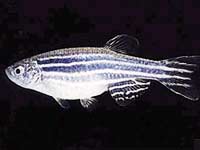Lack of oxygen can change the sex of fish
It is well known that lower oxygen levels in the water can be dangerous to aquatic life. A new study published in the journal Environmental Science and Technology confirms that the lack of oxygen can also cause females to turn into males.

In an oxygen-deficient environment, striped striped fish tend to be more male than females
The indiscriminate use of fertilizers and dumping industrial waste into the river is largely the cause of reduced oxygen levels in the aquatic environment. It is estimated that around the world there are 150 major areas of oxygen deprivation, including the Gulf of Mexico covering an area of about 20,000 km2.
The lack of oxygen in these areas threatens the survival of aquatic organisms. According to Rudolf Wu of the Hong Kong University, this condition seriously affects the sex hormones of fish.
To come to this conclusion, Mr. Wu has raised striped flounders in oxygen-poor water. Shortly after birth, these fish have the same genitals as the ovaries. 10 days to 1 month later, their genes and their environment changed hormone production.
120 days later, Mr. Wu noted that 75% of these striped flounders are male, while in the environment there is normal oxygen concentration, only 60% are male. To explain this, the researcher was particularly interested in enzymes that determine the synthesis of sex hormones. He noted that young fish that live in an oxygen-poor environment have fewer of these enzymes, increasing testoterone levels and also increasing the rate of male fish.
Mr. Wu wondered if the lack of oxygen could have similar effects in humans. Previous studies have shown that people who live above altitude or suffer from sleep apnea have a slightly different rate of hormones than others. However, it is far from possible to confirm that low oxygen levels in the air can increase the number of boys born on Earth!
- Dead fish covered white port in America
- Climate change will cause marine fish to die massively
- Deadly fish mass in the lagoon in Brazil
- The mystery of millions of fish died simultaneously
- Sea fish are increasingly exhausted due to the hot sea
- Scientists explain the phenomenon of sex change in fish
- Detecting the adaptive mechanism of crustaceans when hypoxic
- Interesting secrets about oxygen
- Most creatures on Earth disappeared 2 billion years ago
- Oxygen appeared early on Earth
- Methanobacterium - Gas source in the bottom of the water
- The amount of oxygen in the seawater is decreasing significantly
 Surprised: Fish that live in the dark ocean still see colors
Surprised: Fish that live in the dark ocean still see colors Japan suddenly caught the creature that caused the earthquake in the legend
Japan suddenly caught the creature that caused the earthquake in the legend A series of gray whale carcasses washed ashore on California's coast
A series of gray whale carcasses washed ashore on California's coast Compare the size of shark species in the world
Compare the size of shark species in the world